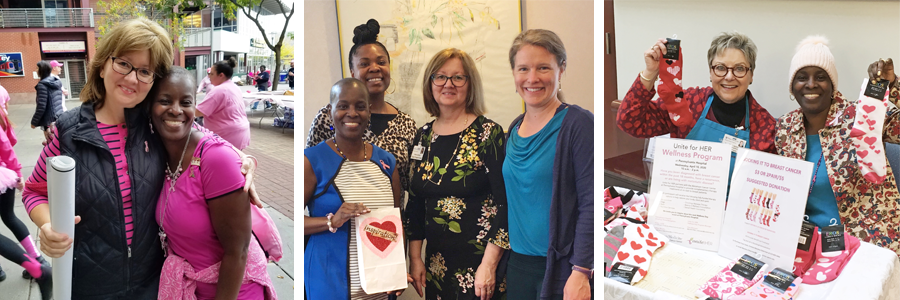Maintaining connections can be difficult these days as stay-at-home orders shut our doors and social distancing guidelines keep us at arm’s length. The impact of this isolation can be especially profound for cancer patients who found a sense of community in support groups and newly diagnosed individuals who may not have found a safe space to work through their emotions yet. This past fall, the Abramson Cancer Center (ACC) at Pennsylvania Hospital partnered with the non-profit Sisters R Us Circle of Survivors to foster these crucial personal connections through a virtual breast cancer symposium.
Created by Yvonne McLean Florence, Sisters R Us Circle of Survivors is a non-profit committed to supporting Black women at every stage of their breast cancer treatment or survivorship journeys. Though Black women and white women experience similar breast cancer incidence rates, the American Cancer Society reports that Black women are about 42 percent more likely to die from breast cancer. This staggering statistic is partly fueled by barriers to preventative care, late-stage diagnoses, and lack of access to information. These issues have been exacerbated during the pandemic, with fears of COVID-19 prompting patients to delay screenings and widening economic inequalities impacting patients’ ability to travel and afford treatment.
Mary Pat Lynch, DNP, RN, AOCN, NEA-BC, administrator of PAH’s Cancer Service Line, and Marylou Osterman, BS, cancer program coordinator, serve on the non-profit’s board and have even secured Penn Medicine CAREs grants to support Florence's efforts. For example, they have helped organize educational workshops, host “Socking It to Breast Cancer” sock sales, and distribute baskets filled with gift cards and comfort items for newly diagnosed patients and patients with metastatic breast cancer. After the board agreed to move the annual symposium online, any initial concerns about “Zoom fatigue” quickly proved unfounded as women from all over the country registered to participate.
“Not everyone who joined was a Penn patient, or even located in the state, but we covered broad topics that resonated with a wide audience,” Lynch said. “The ACC at PAH has a renewed focus on barriers to care, and this is one example of how we’re trying to provide equal, diverse, inclusive care to all of our patients and seek out opportunities to share this important information with the patients who need it.”

The ACC at Pennsylvania Hospital has supported Sisters R Us Circle of Survivors for several years. The strong partnership has continued despite COVID-19. (L-R: Events in 2017, 2019, and 2020, just before the pandemic spread.)
In addition to speakers who discussed topics like wellness through yoga and adapting to hair loss, nurse practitioner Susan L. Kruse Sullivan, CRNP, MSN, and nurse navigator Colleen Murphy, BSN, RN, OCN, each gave talks that shone a spotlight on PAH’s program and prompted thoughtful conversations.
In her keynote address, Sullivan discussed how the concept of survivorship has evolved over time. She broke down the ways in which issues like fatigue, sleep disorders, anxiety and stress, and sexual function can impact a cancer survivor’s quality of life and explained how a mixture of lifestyle changes, medication, and social supports can help. Murphy spoke about how she ensures patients are able to access the care they need in a timely fashion. While not all hospitals have nurse navigators, Murphy encouraged participants to identify a point person who can help them work through any barriers they face, such as inconsistent transportation to treatments or lack of access to healthy food.
“We were just so proud of Sue and Colleen. Their passion came through clearly, and they really hit the nail on the head with their presentations. They were even asked to speak at other conferences following their talks!” Osterman said. “It really was a very special program all around — even virtually, there was a sense of warmth and connection.” The virtual symposium was a hit, and the team has already started developing the next one, which is set to center on palliative care.
“Cancer doesn’t stop because there's a pandemic,” Lynch noted — but neither does the support.